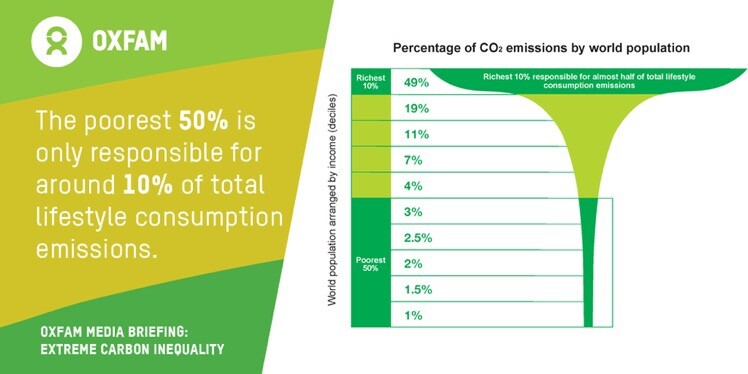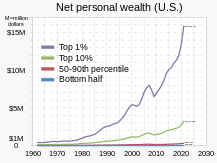Trade, War & Debt
1. Wealth Inequality 2. Trade and Finance 3. Role of the Military 4. Money and Debt
1. Wealth Inequality
The gap between the richest and poorest is extremely high⁹. The richest are the most wasteful, with multiple homes, multiple cars, private jets, yachts, extravagant vacations and even trips to outer space. The lifestyles of the richest 10% create 49% of consumption emissions.

https://www-cdn.oxfam.org/s3fs-public/file_attachments/mb-extreme-carbon-inequality-021215-en.pdf
There is constant competition for wealth, resources, and the basic necessities of life, and a culture and system that concentrates these into fewer and fewer hands.

https://en.wikipedia.org/wiki/Wealth_inequality_in_the_United_States
Business owners, investors and lenders profit from the wealth created by employees and their ideas, even when employees are not paid a living wage (see CEOs vs employees, Profits vs wages). Most of us depend for our survival and security on bosses, yet our work can often be automated or outsourced.
Stock purchasers usually are unaware of, or care little about how a company makes money, pollutes the environment or treats employees, mostly caring about the return on investments. Most of us depend on investments to make a living, protect our homes and loved ones, or save for retirement. However, financial institutions gamble with our savings and retirement plans. Insurance is based on risk, not on need. Most homeowner insurance does not include flood insurance. The largest insurance companies are cutting back on insuring natural disasters due to climate change. While insurance usually pays for prescribed medications, it generally doesn't pay for natural remedies. Insurance requirements dictate shorter doctor's visits and reduced nurse patient care due to increased paperwork.
2. Trade and Finance
All of the world is interconnected, not just environmentally, but in terms of trade. The richer countries control most of the world’s finances, use the labor of poorer countries and extract their resources. Raw materials are mined and parts are made in several countries and shipped to others for manufacturing or assembly. Colonialism has left a legacy of limited infrastructure in poorer countries. With little capital of their own, poorer countries manufacture fewer finished goods than richer countries. In order to raise cash, they export raw materials and large scale single crops, which leaves them dependent on expensive imports of finished goods and foods.
International financial institutions pressure poorer countries to cut social services to pay the interest on loans. While the richer countries need to shrink their economies to reduce consumption of energy and resources, poorer countries may need to grow their economies to meet their own needs.
To reduce unnecessary and wasteful long distance shipping and the need for expensive imports, manufacturing of finished goods and food production for local consumption need to be distributed closer to where they are needed. This includes the releasing of patents and the sharing of technology and expertise. Loans that cannot be repaid need to be written off.
3. Role of the Military
Making the rich pay their fair share of taxes is necessary for the good of all. However, most military spending is not. The huge military-industrial and intelligence complex shapes the entire US economy and influences our internal affairs. The US military budget is currently more than half of the discretionary budget, greater than that of the next several countries combined, way more than necessary for self defense.
https://www.pgpf.org/blog/2023/04/the-united-states-spends-more-on-defense-than-the-next-10-countries-combined
To be fair, most young men and women serving in the military have the best intentions to serve their country, and/or see the military as their only option for getting the education and jobs they need. They all deserve adequate health care, including care for disabling injuries and post traumatic stress, and adequate housing. Sometimes the national guard provide water where it is needed during droughts, but often they are used to suppress dissent. Sometimes the Army Corp of Engineers carry out helpful projects for flood control, and other civil works.
However, the armed US military and intelligence forces have little to do with actual defense of our borders. Most military actions have been outside our existing borders, expanding the power of and access to resources by US corporations. The US took land from Native Americans, Britain, France, Spain, Canada, Mexico, and Hawaii. We have initiated hundreds of military and paramilitary interventions all over the world. Our dependence on Middle Eastern and African oil is inseparable from interventions in those areas. Military weapons production and deployment, training exercises and air shows and military bases sprawled all over the world have an enormous carbon footprint, and are a waste of taxpayer money. They mostly serve the financial interests of the richest people through their war industries and their access to the world's resources and cheap labor.
A better role for existing military-industrial enterprises in the transition to a peaceful world would be to convert from nuclear, chemical and biological armament production to renewable energy technology (windmills, solar panels, etc), and the recycling of toxic materials and single use plastics.
A better role for existing armed forces in the transition to a peaceful world would be to transition away from warfare to enforcement of ecological and humanitarian standards.
4. Money and Debt
When banks lend out money, they are only required to actually have 10% of the amount they loan. The rest is newly “created” money that they expect to get back with compound interest.
To raise enough money to pay back the interest and principal requires growth. We either have to work longer hours, get pay raises or make and sell more products.
When people work longer hours, they often seek relief from the tedium through extravagant vacations and increased consumption. Together with unexpected expenses, such as medical expenses, childcare or eldercare expenses, this creates more debt and can lead to loss of livelihood.
Here are some things we can institute to end this vicious cycle, allow us to reduce working hours and increase equality:
1. Cancel all unpayable debts
2. Replace compound interest with simple interest
3. Cap interest rates
4. Require banks to actually have 100% of the money they loan out
5. Shift excess military spending to universal basic services

Comments
Post a Comment